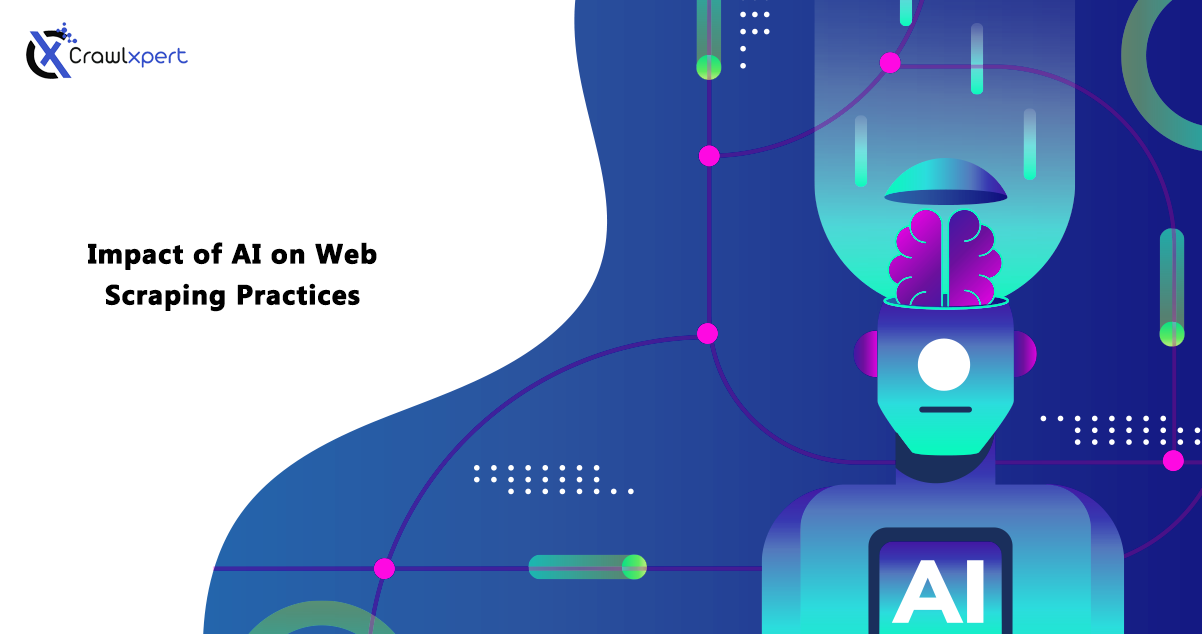
Impact of AI on Web Scraping Practices
Apr 26, 2025
Introduction
Owing to advancements in artificial intelligence (AI), the history of web scraping is a story of evolution towards efficiency in recent times. With an increasing number of enterprises and researchers relying on data extraction in deriving insights and making decisions, AI-enabled web scraping methods have transformed some of the traditional techniques into newer methods that are more efficient, more scalable, and more resistant to anti-scraping measures.
This blog discusses the effects of AI on web scraping, how AI-powered automation is changing the web scraping industry, the challenges being faced, and, ultimately, the road ahead for web scraping with AI.
How AI is Transforming Web Scraping
1. Enhanced Data Extraction Efficiency
Standard methods of scraping websites and information are rule-based extraction and rely on the script that anybody has created for that particular site, and it is hard-coded for that site and set of extraction rules. But in the case of web scraping using AI, such complexities are avoided, wherein the adaptation of the script happens automatically with a change in the structure of the websites, thus ensuring the same data extraction without rewriting the script constantly.
2. AI-Powered Web Crawlers
Machine learning algorithms enable web crawlers to mimic human browsing behavior, reducing the risk of detection. These AI-driven crawlers can:
- Identify patterns in website layouts.
- Adapt to dynamic content.
- Handle complex JavaScript-rendered pages with ease.
3. Natural Language Processing (NLP) for Data Structuring
NLP helps in:
- Extracting meaningful insights from unstructured text.
- Categorizing and classifying data based on context.
- Understanding sentiment and contextual relevance in customer reviews and news articles.
4. Automated CAPTCHA Solving
Many websites use CAPTCHAs to block bots. AI models, especially deep learning-based Optical Character Recognition (OCR) techniques, help bypass these challenges by simulating human-like responses.
5. AI in Anti-Detection Mechanisms
AI-powered web scraping integrates:
- User-agent rotation to simulate diverse browsing behaviors.
- IP Rotation & Proxies to prevent blocking.
- Headless Browsers & Human-Like Interaction for bypassing bot detection.
Applications of AI in Web Scraping
1. E-Commerce Price Monitoring
AI scrapers help businesses track competitors' pricing, stock availability, and discounts in real-time, enabling dynamic pricing strategies.
2. Financial & Market Intelligence
AI-powered web scraping extracts financial reports, news articles, and stock market data for predictive analytics and trend forecasting.
3. Lead Generation & Business Intelligence
Automating the collection of business contact details, customer feedback, and sales leads through AI-driven scraping solutions.
4. Social Media & Sentiment Analysis
Extracting social media conversations, hashtags, and sentiment trends to analyze brand reputation and customer perception.
5. Healthcare & Pharmaceutical Data Extraction
AI scrapers retrieve medical research, drug prices, and clinical trial data, aiding healthcare professionals in decision-making.
Challenges in AI-Based Web Scraping
1. Advanced Anti-Scraping Technologies
- Websites employ sophisticated detection methods, including fingerprinting and behavioral analysis.
- AI mitigates these by mimicking real user interactions.
2. Data Privacy & Legal Considerations
- Compliance with data regulations like GDPR and CCPA is essential.
- Ethical web scraping practices ensure responsible data usage.
3. High Computational Costs
- AI-based web scrapers require GPU-intensive resources, leading to higher operational costs.
- Optimization techniques, such as cloud-based scraping, help reduce costs.
Future Trends in AI for Web Scraping
1. AI-Driven Adaptive Scrapers
- Scrapers that self-learn and adjust to new website structures without human intervention.
2. Integration with Machine Learning Pipelines
- Combining AI scrapers with data analytics tools for real-time insights.
3. AI-Powered Data Anonymization
- Protecting user privacy by automating data masking and filtering.
4. Blockchain-Based Data Validation
- Ensuring authenticity and reliability of extracted data using blockchain verification.
Conclusion
The addition of AI to the web scrape has made it smarter, flexible, and scalable as far as data extraction is concerned. The use of AIs for web scraping will help organizations navigate through anti-bot mechanisms, dynamic changes in websites, and unstructured data processing. Indeed, in the future, web scraping with AI will only be enhanced and more advanced to contribute further innovations in sectors across industries.
For organizations willing to embrace the power of data extraction with AI, CrawlXpert brings you state-of-the-art solutions designed for the present-day web scraping task. Get working with CrawlXpert right now in order to gain from AI-enabled quality automated web scraping solutions!